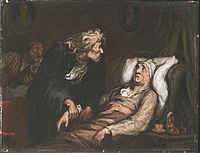
Photo from wikipedia
Aim Responses to health anxiety include avoidance and reassurance-seeking behaviors. We tested the hypothesis that avoidance would be associated with less healthcare use and reassurance seeking with more healthcare use.… Click to show full abstract
Aim Responses to health anxiety include avoidance and reassurance-seeking behaviors. We tested the hypothesis that avoidance would be associated with less healthcare use and reassurance seeking with more healthcare use. Subjects and methods Participants’ ( n = 395) complete measures of health anxiety behaviors, healthcare use in the previous 12 months (outpatient visits, emergency room visits, urgent care visits, number of doctors, number of scans, number of blood tests), and health anxiety intensity as a covariate. Results Our hypothesis was partially supported, as reassurance seeking was associated with more healthcare use ( p -values < 0.04), except that general reassurance seeking was not associated with number of scans ( p = 0.327). Avoidance was not associated with healthcare use ( p -values > 0.05), except for general avoidance with fewer scans ( p = 0.010) and blood tests ( p < 0.001). Conclusions Future research on health anxiety should consider coping responses such as avoidance and reassurance seeking, and should extend this research to clinical care and similar concepts, like cancer worry.
Journal Title: Journal of Public Health
Year Published: 2020
Link to full text (if available)
Share on Social Media: Sign Up to like & get
recommendations!